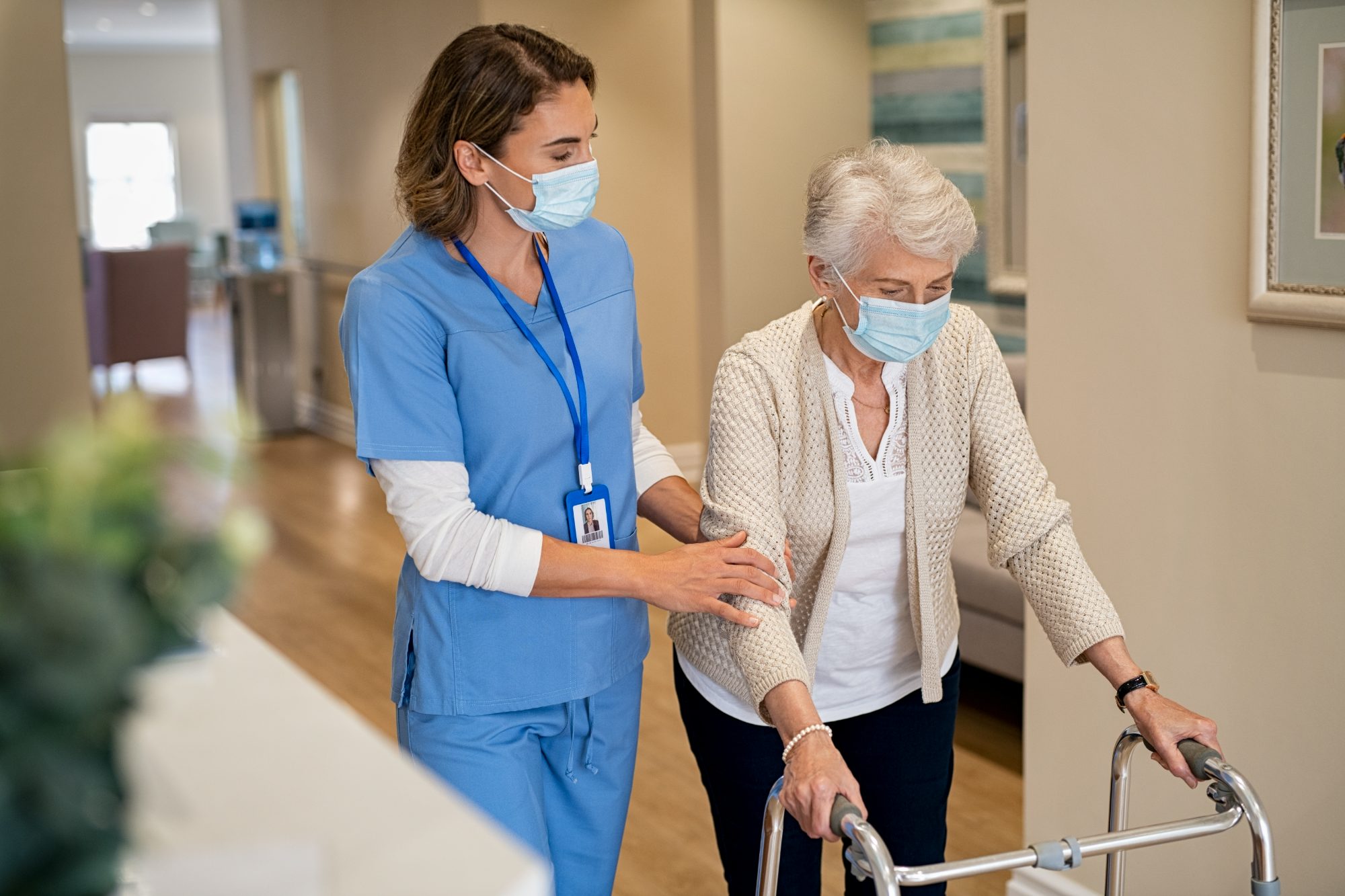A Closer Look at Geriatric Nursing: How to Start a Fulfilling Career in Senior Healthcare

Addressing the distinct healthcare needs of the older generation has taken on unprecedented importance, and the demand for experts who can navigate the intricacies of geriatric care is surging fast. As a result, Geriatric Nurses emerge as indispensable professionals, entrusted with the responsibility of delivering not only nursing attention but also empathy and support tailored to the aging community.
If this meaningful and impactful nursing career sounds right up your alley, and you're interested in learning more about it, you have come to the right place.
In this blog post, we take a closer look at the geriatric nursing profession, exploring its responsibilities, challenges, rewards, and the ever-growing significance it holds in today's world of healthcare. We also look at how to become a Geriatric RN, where they work, and much more.
Regardless of whether you're a nursing student or an experienced nurse considering a new path, this guide will serve as your ultimate resource on gerontological nursing.
Let's get started.
Why Is Geriatric Care in High Demand?
With the American population rapidly aging, the significance of geriatric nursing has never been more profound.
According to the Population Reference Bureau, the number of Americans aged 65 and older is expected to nearly double from 52 million in 2018 to a staggering 95 million by 2060. As the 65-and-older age group's share of the total population rises from 16 percent to 23 percent, the demand for specialized healthcare professionals capable of addressing the unique needs of geriatric patients becomes increasingly critical.
Geriatric Nurses, also known as Gerontological Nurses, specialize in caring for older people. They play a pivotal role in optimizing health services for this growing demographic. As elder care nurses, Geriatric RNs ensure seniors receive compassionate, skilled, and personalized care while they navigate their later years, making their role absolutely critical.
What Is Geriatrics Nursing vs. What Is Gerontology Nursing?
Geriatrics involves medical and nursing care tailored for older adults. Gerontology delves into the study of aging, covering biological, sociological, and psychological changes.
In essence, geriatrics nursing is more directly associated with the hands-on nursing care of older adults, while gerontology nursing takes a holistic approach, focusing on the overall study of aging and its multifaceted effects on people and society.
Both areas are essential in ensuring that ageing people receive comprehensive care that addresses their medical conditions and promotes their overall health, happiness, and sense of belonging in the later stage of their life. While there are some slight distinctions between the roles, they often get used interchangeably.
How to Become a Geriatric Nurse

The minimum educational requirement for those aspiring to become a Geriatric Nurse entails obtaining a licensed Registered Nurse credential. Becoming a Registered Nurse usually takes two to five years, depending on your chosen nursing program.
Let's explore the step-by-step process to truly understand the amazing journey of building a career in geriatric nursing and providing specialized care for older adults.
Step 1: Obtain a Nursing Degree
Start by acquiring the necessary education to become a Registered Nurse.
Irrespective of the nursing specialty you ultimately choose, the initial step of any nursing job involves enrolling in an accredited nursing program. Depending on your aspirations, financial considerations, and time availability, two main educational routes can bring you closer to obtaining the coveted RN license.
One option is to enroll in an Associate's Degree in Nursing (ADN) program. Typically taking around two years to complete, this program satisfies the minimal prerequisite for securing RN licensure.
Alternatively, enrolling in a Bachelor's Degree in Nursing program (BSN) is the most recommended pathway. Although this track takes approximately four years to finish, it provides a more comprehensive foundation for a future nursing career.
When you invest more time studying and gaining experience through a BSN program, you'll find yourself better equipped to achieve improved patient outcomes and elevate the quality of care you provide. This enhanced proficiency will increase demand for your services, giving you added job security and opening up broader avenues for advancing your career.
Read more about the real differences between ADN and BSN prepared Nurses.
You'll find that the trend favoring BSN-prepared nurses is quickly catching. According to an annual survey conducted by the AACN, over 71% of employers clearly prefer nurses with a baccalaureate degree. Enrolling in a BSN program gives you a competitive advantage in the job market, setting you apart from peers who've had ADN training. Your commitment to advancing your education will undoubtedly make you stand out and thrive in the nursing landscape.
Recognizing the unquestionable significance of BSN degrees in the nursing field, it's crucial to opt for a quality program that will prepare you for the nitty-gritty of the job.
With a duration of 32 months and a blended format, Nightingale College's BSN program is that type of degree.
Combining online didactic instruction with on-ground supervised field experience, this program offers a comprehensive avenue to amplify your nursing skills and prospects. It's flexible and accessible, and it empowers you to earn your Bachelor of Science in Nursing degree in less than three years.
Learn more about our BSN program.
Step 2: Obtain Nursing Licensure
Your nursing journey doesn't stop at enrolling and completing a nursing program, whether ADN or BSN. The path to obtaining a Registered Nurse license progresses with Phase Two: successfully clearing the NCLEX-RN.
The NCLEX-RN, or the National Council Licensure Examination for Registered Nurses, is a five-hour computer adaptive test that evaluates your readiness and knowledge as a prospective practicing nurse. Although it's no small feat, a reputable nursing program will give you the essential knowledge and abilities to confidently excel in this test.
Step 3: Gain Nursing Experience
Now you can officially begin your nursing career and start gaining valuable experience.
Start by revising your nursing resume to highlight valuable skills in this compassionate field. Prepare for forthcoming job interviews, and start a career that resonates with your passion.
First-hand nursing experience is an invaluable cornerstone in your journey as a Geriatric Nurse. While the knowledge and skills you acquire during your education lay a strong foundation, it's the hands-on experience in the field that truly amplifies your capabilities and understanding of geriatric care.
Step 4: Pursue Geriatric Nursing Certification
While getting certified is not mandatory for RNs, obtaining a certification in geriatric nursing from a recognized organization can enhance your expertise and career prospects.
An excellent geriatric nurse certification for RNs who wish to get certified in this specialty is the Gerontological Nursing Certification (GERO-BC) from the American Nurses Credentialing Center.
To be eligible for this certification, you need to meet the following criteria:
- Hold a current, active RN license.
- Have practiced for two years as a Registered Nurse.
- Have a minimum of 2,000 hours of clinical practice in the specialty area of gerontological nursing within the last three years.
- Have completed 30 hours of continuing education in gerontological nursing within the last three years.
Geriatric Nurse Practitioners who wish to get certified further can pursue specialized recognition by becoming APRN Gerontological Specialist - Certified (GS-C). This certification is available through the collaboration of GAPNA and the Gerontology Nursing Certification Commission (GNCC).
Step 5: Consider Advanced Education
If you have an ADN background and aspire to elevate your career to the BSN level, the logical progression is to consider enrolling in a bridge RN-to-BSN program.
These degree programs accommodate the busy schedules of Geriatric RNs. They are most often accessible online and can be finished within a span of just one to two years. This advantageous arrangement permits you to pursue advanced education without giving up your current position – a pivotal factor for many Geriatric Nurses trying to decide if pursuing the degree is the right choice.
Nightingale College offers an exceptional RN-to-BSN program meticulously designed to cater to the needs of nurses already engaged in the workforce. In as little as 12 months, you can profoundly enhance your nursing expertise – all while benefiting from the benefits of online education.
If you already have a BSN degree and want to further your education, consider advanced degrees, such as a Master of Science in Nursing (MSN), which will open doors to geriatric nurse practitioner jobs. While it does take an extra two to three years to get your MSN, this is the way to go if you're interested in leadership roles and specialized practice areas.
What Does a Geriatric Nurse Do?

Geriatric Nurses fulfill a diverse range of responsibilities to ensure the well-being of their senior patients. Their role is exhaustively vital in promoting health, preventing illnesses, managing chronic conditions, and ultimately enhancing seniors' overall quality of life. But let's zoom in to see the duties and tasks that Geriatric Nurses tackle daily on the job.
- They conduct thorough assessments to understand the physical, cognitive, emotional, and social aspects of the geriatric patient's health.
- Geriatric Nurses help develop personalized care plans that address the specific needs and goals of individual older adults, considering their medical history, chronic conditions, and lifestyle.
- A key aspect of their responsibilities involves the administration of medications while diligently supervising patients' adherence to prescribed regimens. This not only prevents any unwanted drug interactions but also ensures the proper dosages are on track.
- Gerontological RNs help patients manage chronic illnesses commonly associated with aging, such as diabetes, hypertension, arthritis, and dementia.
- They implement fall prevention strategies to safeguard elderly patients from accidents and injuries.
- Among their tasks, Geriatric Nurses also help older adults maintain mobility and independence through physical therapy and assistive devices.
- They provide compassionate care and support to terminally ill patients and their families during the end-of-life journey.
- A vital part of their duties revolves around educating patients and their families about health conditions, treatment options, and strategies for managing age-related challenges.
Geriatric Nursing Specializations
Taking care of the older generation involves a lot of different aspects, which has led to the development of several nursing subspecialties related to the field of geriatric care that you can explore.
Here are some examples of Geriatric Nursing specializations:
- Memory Care: Focused on patients with dementia or Alzheimer's disease, Geriatric RNs working in memory care nursing provide specialized care, management of behavioral issues, and support for families.
- Hospice Nursing: Hospice Nurses offer comfort, pain management, and emotional support to patients with terminal illnesses, ensuring they spend their final days with dignity and peace.
- Geriatric Rehabilitation: Specializing in rehabilitation after injury, surgery, or stroke, these nurses help elderly patients regain independence and functional abilities.
- Long-Term Care: Nurses in long-term care facilities support residents with chronic health conditions and daily living activities, fostering a nurturing and supportive environment.
Where Do Geriatric Nurses Work?
Geriatric Nurses can work in diverse settings, including:
- Geriatric Nurses can work in hospitals, specializing in geriatric care wards, or working in medical-surgical departments to care for elderly patients.
- Geriatric Nurses provide round-the-clock care for older adults residing in nursing home facilities.
- Assisted living facilities, where Geriatric RNs support seniors with daily activities while preserving their independence.
- Geriatric Nurses offer in-home care services, ensuring elderly patients can access nursing services comfortably in their own place.
- Nurses in hospice and palliative care centers provide end-of-life care and comfort to terminally ill patients.
Geriatric Nurse Salary: How Much Do Geriatric RNs Make?
Getting into geriatric nursing offers not only the opportunity to make a difference in the lives of your patients but also the potential for substantial financial rewards. According to data from ZipRecruiter, the nationwide average salary for Geriatric Nurses in 2025 stands at around $112,000 per year.
It's important to note that several factors contribute to how much Geriatric Nurses can earn.
Geographic location plays a role, as areas with a higher cost of living or greater demand for specialized healthcare services may offer higher compensation. Experience level, advanced degrees, certifications, and additional skills are also influential factors. The healthcare setting where you work, whether a hospital, long-term care facility, home healthcare, or hospice, can also impact salary levels.
Are You Ready to Become a Geriatric Nurse?
As a Geriatric Nurse, you can profoundly impact older adults' lives, ensuring their well-being, comfort, and dignity.
If this sounds like the job for you, why wait?
Start following the steps outlined in this guide and commence your journey to a meaningful career that embraces aging patients' unique needs and challenges.
Enroll in Nightingale College's BSN program or advance your degree with our online RN-to-BSN program. We're excited to help you succeed in becoming a Geriatric Registered Nurse!

